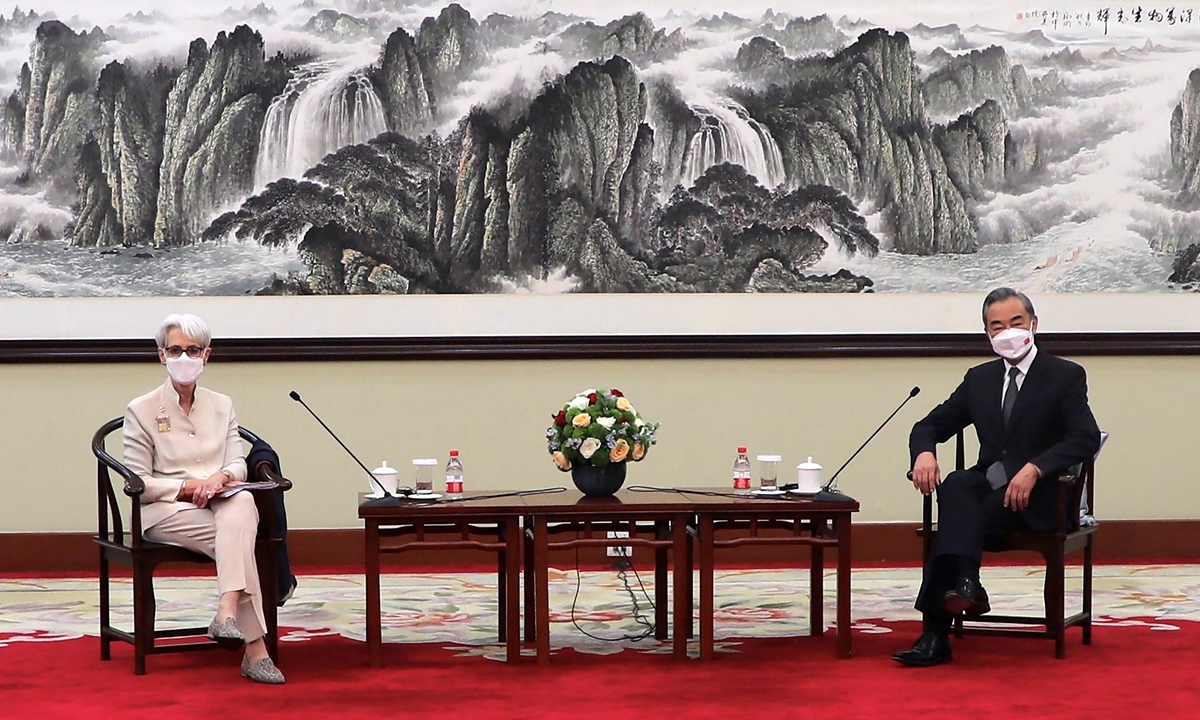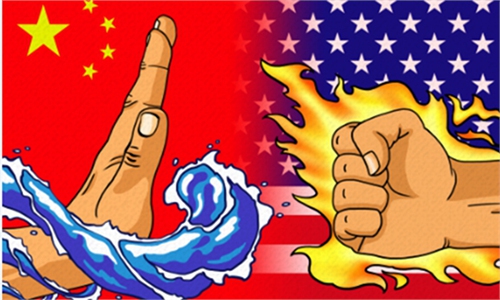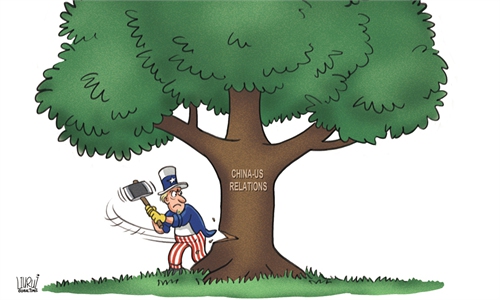China elaborates bottom lines, suggests remedial measures
‘Candid’, intense interaction helps two countries stay in touch

Chinese State Councilor and Foreign Minister Wang Yi (right) meets with visiting US Deputy Secretary of State Wendy Sherman on Monday in Tianjin. Photo: AP
Chinese State Councilor and Foreign Minister Wang Yi elaborated China's three bottom lines in effectively managing and controlling divergences in China-US relations — the US should not challenge, smear or seek to subvert the Chinese path and system, should not seek to interrupt or disrupt China's development, should not violate China's national sovereignty or territorial integrity — during his meeting with US Deputy Secretary of State Wendy Sherman on Monday.By making clear bottom lines and urging the US to correct its wrong mindset and wrong actions - the main cause for a stalemate to the already struggling China-US relations - China raised sharp questions to the US on Monday that how the US could seek any good results of the bilateral ties with its policy of suppressing China.
Such a proactive way of laying out Beijing's bottom lines and elaborating major concerns to Washington followed a hardline diplomatic approach, first used at the China-US Alaska meeting in March, should end the wishful thinking among some US politicians who believe that the visit of US Deputy Secretary of State could explore whether the China policy of the Biden administration worked out over the past six months.
Sherman raised again the so-called international rules-based order, to which Wang responded that if the rules the US side refers to is rules made by the US and a small number of other countries, what justifies them to impose those rules on China?
High tariffs the US imposed on Chinese goods violate WTO rules and unilateral sanctions violate international rules. On following international rules, the US should be the one to reflect, Wang noted.
US needs tutorial, policy change
The fundamental reason for the deadlock in China-US relations is that some in the US always see China as an "imaginary enemy," Chinese Vice Foreign Minister Xie Feng told Sherman, as the meeting on Monday began in North China's Tianjin, which was described as a tense start of the high-level talks. Before the meeting, the US sanctioned Chinese officials over Hong Kong, forming an anti-China chorus over issues of Xinjiang, Taiwan, the South China Sea and cyber security.
"Washington has been trying to contain China, thinking that will solve its problems, as if the only way for the US to become great again is to contain China's development," Xie said.
The hardline rhetoric and tough stance of the senior Chinese diplomat was expected by some Chinese observers. Just two days ahead of the meeting, Chinese State Councilor and Foreign Minister Wang Yi said the US needs a tutorial on treating other countries equally, as no country is superior to others, and China will never accept any country that thinks of itself this way.
Through this meeting, China hopes to express its principles and fundamental position toward the US, as the Biden administration has yet to abandon the mistakes made by its predecessor since he took office in January, which will only bring further damage to China-US relations, Lü Xiang, a research fellow at the Chinese Academy of Social Sciences in Beijing, told the Global Times on Monday.
"However, the US might take Sherman's visit to explore how Biden's China policy has worked out so far. For those who believe that containing and suppressing China has been succeeding, they may feel disappointed after this meeting," Lü said.
Sherman raised concerns over a number of issues including human rights, the situation in Hong Kong, the so-called "ongoing genocide and crimes" in Xinjiang, as well as accusations of Beijing over cyber security, the Taiwan and the South China Sea, according to a statement published on the website of the Department of State on Monday.
She was "very forceful" on those issues, the AFP said, citing US officials, who also described the meeting as candid and professional.
In an unprecedented move, China also raised a List of US Wrongdoings that Must Stop so that the Biden administration could repair the fraught ties, including unconditionally revoking visa restrictions on members of the Communist Party of China (CPC) and their families, as well as on Chinese students, stop suppressing Chinese companies and the Confucius Institutes, stop registering Chinese media as ''foreign missions'' and revoking the extradition of Meng Wanzhou.
Meanwhile, in another list of Key Individual Cases that China Has Concerns with, China highlighted cases that it attaches the greatest importance to, such as some Chinese students being refused visas to the US, the unfair treatment of Chinese nationals in the US, Chinese diplomats and consular missions being harassed in the US, and growing anti-China sentiment in the country.
"The lists sent two messages: First, China has been more proactive in handling relations with the US. In the past, it was the US bringing up the lists toward which China responded. By taking the initiative, Chinese officials also demonstrated a 'new normal' in diplomacy," Wu Xinbo, director of the Center for American Studies at Fudan University in Shanghai, told the Global Times on Monday.
"Second, China underscored its goodwill in improving China-US relations. The issues mentioned are also widely shared concerns in Chinese society. Only with concrete US government moves to solve them can China-US relations see an improvement and positive changes," Wu said.
'The ball in Washington's court'
During the meeting, the Chinese diplomat pointed out that some people in the US have been bringing up the so-called "Pearl Harbor Moment" and "Sputnik Moment" in reference to the China-US conflicts. The purpose of such metaphors is to demonize China as an "imaginary enemy."
The US hope may be that "by demonizing China, it could somehow shift domestic public discontent over political, economic and social issues and blame China for its own structural problems. It seems that a whole-of-government and whole-of-society campaign is being waged to bring China down," Xie told Sherman at the meeting.
Apart from expounding on its principle position on China-US relations, and requiring the US side to change its extremely wrong perception and dangerous policy toward China, China once again expressed strong dissatisfaction with the US side over its wrong words and deeds on issues relating to COVID-19 origin-tracing, Taiwan, Xinjiang, Hong Kong and the South China Sea, urging the US side to immediately stop interfering in China's internal affairs, stop damaging the interests of China, stop crossing the red lines and playing with fire, and stop seeking bloc confrontation under the guise of values.
"We asked the US to stop interfering in China's internal affairs, stop damaging China's interests, stop stepping on the red lines and playing with fire, and stop using the excuse of values in forming allies to confront China," Zhao said.
Chinese officials and experts consider such candid interaction between senior diplomats of the two countries helpful for future relations, and the ball is in America's court to change its wrong mindset and policy of demanding cooperation, while at the same time damaging China's interests.
On China's latest countermoves sanctioning six US individuals and one entity responding to US sanctions over Hong Kong, China reacted with restraint, leaving room for China-US relations to improve, Lü noted.
"The key issue now is whether the US can eventually realize what's wrong with its policy by continuing to suppress China," he said, noting that if there's a consensus shaped in the White House to make some changes, the possibilities for further interaction, including the one between the top leaders, remain bright.



